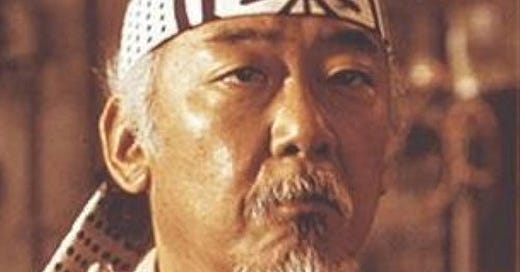When someone says the word “mentor”, who comes to mind? Middle-aged-to-older Westerners might picture Mr. Miyagi, a fictional sensei in the 1980s hit “The Karate Kid.”
The film introduces us to Daniel LaRusso, a nerdy teenager who’s just moved to California. He’s bullied by some local gangsters who are all students at Cobra Kai dojo. Once, as these boys are ruthlessly beating Daniel, an old Japanese handyman, Mr. Miyagi, rescues him and single-handedly drives off the bullies. Mr. Miyagi then takes Daniel under his wing to teach him how to defend himself.
However, Mr. Miyagi’s training methods are bizarre; at first, he makes Daniel spend countless hours painting his fence, waxing his car, and sanding his floors. Daniel thinks it’s a waste of time; this old Japanese retiree is just scamming for some free labor. But Mr. Miyagi knows exactly what he is doing; the motions used to paint fences, wax cars, and sand floors are strengthening Daniel’s muscles and shaping the muscle memory required for Martial Art proficiency.
Through this odd process, Mr. Miyagi offers us some clues about mentoring:
The mentor helps the mentee reframe his/her thinking;
The mentor helps the mentee practice actions repeatedly until he/she establishes useful habits for personal development;
The mentor shows the mentee how actions that often feel fruitless at first actually have real life impact;
The mentor helps the mentee envision something greater than his/her present circumstances;
The mentor cares about the personal development of the mentee, not just his/her performance.
The mentor cares for the mentee not as a project but as a real individual.
Of course, wise Mr. Miyagi was just a figment of the screenwriter’s imagination; and most people would agree that “The Karate Kid” and its sequels were pretty campy. And yet, that cheesy movie still struck a chord with millions of people, as mentor movies generally do (e.g., “Good Will Hunting,” “KungFu Panda,” “Star Wars,” even a “Karate Kid” reboot 26 years later). People connect deeply, and often longingly, with the concept of mentoring.
The Oxford dictionary defines the verb “mentor” this way: to “advise or train (someone, especially a younger colleague)”. The Cambridge English Dictionary defines the noun “mentoring” as: “the act or process of helping and giving advice to a younger or less experienced person, especially in a job or at school.” Here is our basic definition of “mentoring” for the purposes of this series:
Mentoring Defined
“Mentoring” is the process by which a more-experienced person advises and trains a less-experienced person.
Activity: Who Mentored You?
Who has played a significant mentoring role in your life?
What were the two or three biggest takeaways from your time being mentored by him/her?
How did the mentor encourage you?
How did the mentor challenge you?
(Feel free to share your answers in the comments!)
Next: What Is the Goal of Mentoring Christians?





Ann Warner Tolly! She was the first person to call me a “prayer warrior” -- a title I didn’t deserve but wanted so badly to live up to. There is a lady at our church who mentors teens this way by calling out unseen potential in my kids and all the middle schoolers/high schoolers. I am so grateful for her.